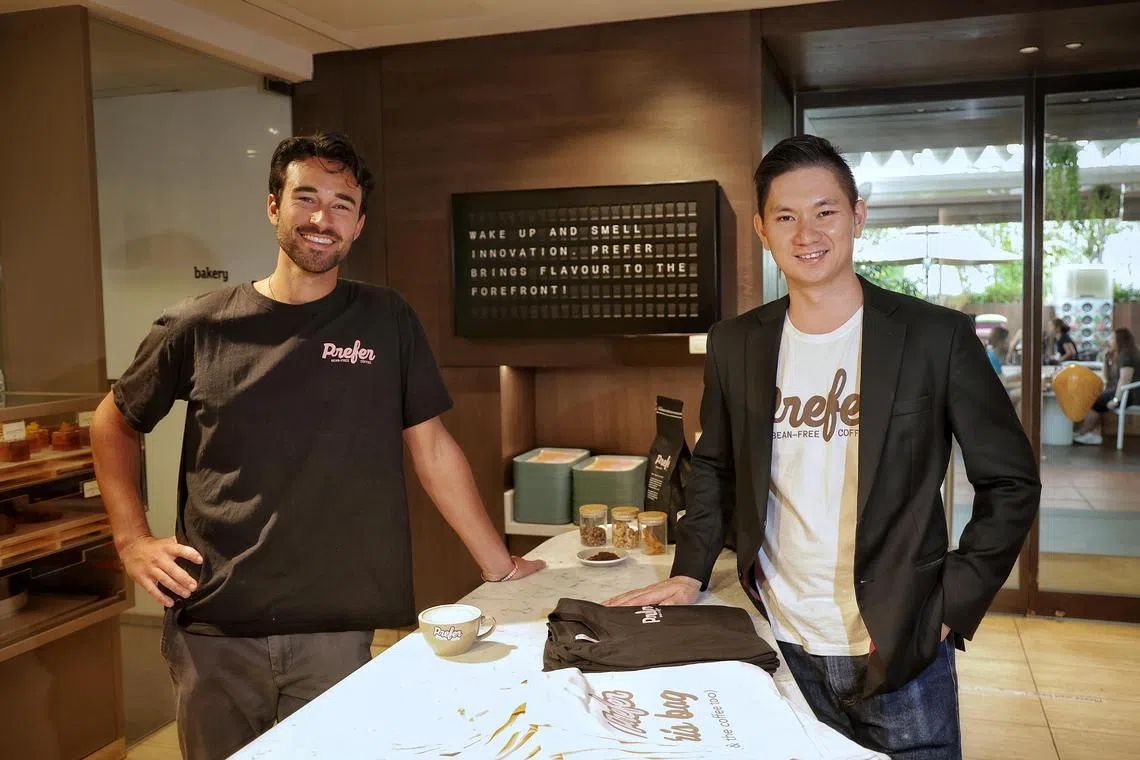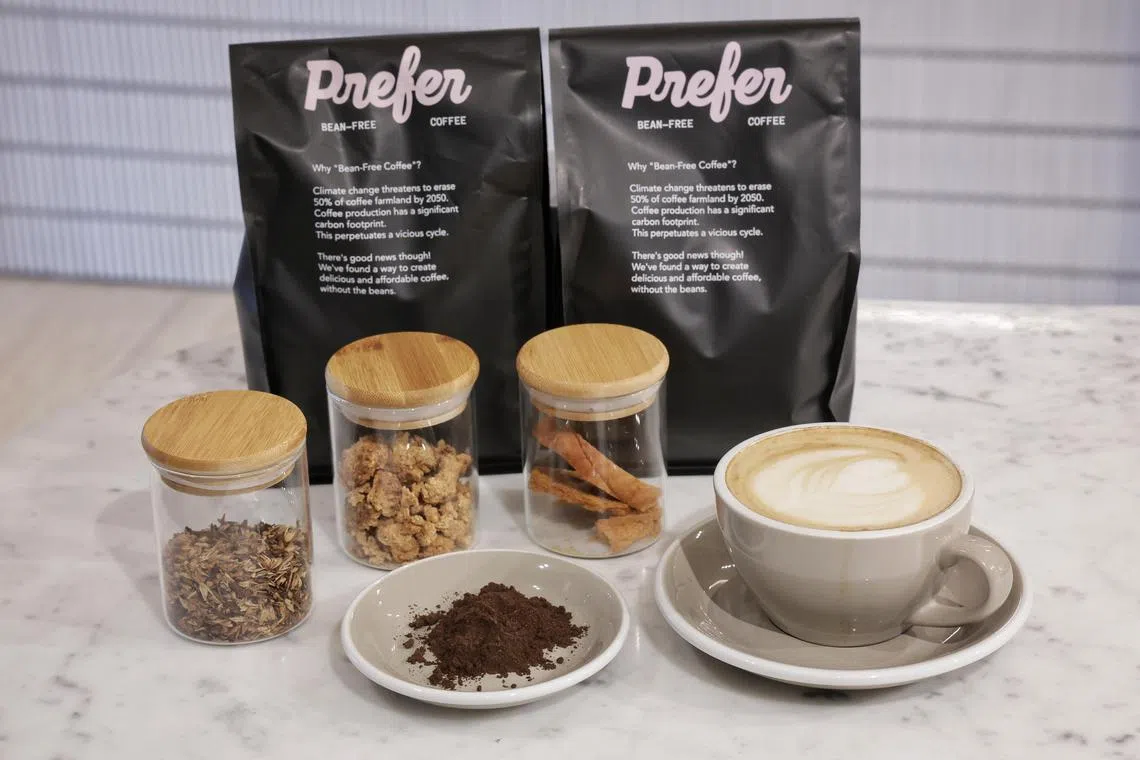Local start-up Prefer launches bean-free coffee made from bread, spent barley and soya bean pulp
Sign up now: Weekly recommendations for the best eats in town

Prefer co-founders Jake Berber (left) and Tan Ding Jie have developed an alternative coffee as the crop is threatened by climate change and also contributing to it.
ST PHOTO: KEVIN LIM
SINGAPORE – You have heard of meatless meat and seafoodless seafood.
Now, meet beanless coffee from home-grown sustainable bio-flavours start-up Prefer.
Its “coffee” is an upcycled product made of day-old bread from baked goods company Gardenia, soya bean pulp from soya bean chain Mr Bean and spent barley grains from local breweries such as The 1925 Brewing Co and Brewerkz.
The ingredients are blended, fermented with food-grade microbes, then roasted in an oven to enhance the aromas and flavours. Finally, the mixture is ground up.
This whole process takes about 48 hours, as opposed to waiting three to four years for newly planted coffee trees to bear their first fruit and for annual harvests of coffee beans.
While Prefer’s grounds are caffeine-free, caffeine powder derived from tea can be added and adjusted to the preferred levels.
The beverage is brewed just like the real thing, with no extra steps required in the extraction process when using a coffee machine.
It has enough crema – the layer of creamy froth that forms on top of an espresso – to allow baristas to create latte art designs with dairy or plant-based milk.
Prefer’s offerings have been brewing in selected cafes since December 2023, following a year of product development since it was co-founded in 2022 by Singaporean food scientist Tan Ding Jie, 32, and Texas-born former neuroscientist Jake Berber, 26.
Its media launch on Feb 22 marks the company’s official debut to the public, as well as the announcement of its US$2 million (S$2.68 million) funding raised to scale up production and grow its team.
Prefer’s products are available at 14 food and beverage (F&B) outlets, including SaladStop, Foreword Coffee Roasters, Coexist Coffee and Dough, where the launch was held.
Members of the media tried an espresso tonic as well as an oat milk latte, both made with Prefer’s decaffeinated coffee. The espresso tonic carried sweet and slightly bitter notes of coffee, while any coffee flavour in the latte was largely masked by the use of oat milk.
These are not in the market yet as F&B businesses are free to come up with their own applications of Prefer’s coffee, says Mr Tan, a chemistry graduate from University College London and a former research officer at A*Star’s Biotransformation Innovation Platform research programme.
He notes that the current formula is version two of the product, which it is constantly looking to improve based on customer feedback.
Dough’s bean-free version of the oat milk latte ($7.50) comes with macadamia nut syrup. Its regular oat milk latte, which does not have macadamia nut syrup, is priced from $5.50.
Pricing-wise, Prefer’s product is meant to be on a par with normal coffee beans. It is also up to the dining establishments to price the drinks accordingly on their menus, adds Mr Tan.

Prefer is made (from left to right in the bottles) with spent barley grains, soya bean pulp and day-old bread. The ground coffee can be brewed like the real thing.
ST PHOTO: KEVIN LIM
Mr Tan and Mr Berber – whose paths converged in 2022 at food accelerator Entrepreneur First – chose to develop an alternative coffee as it is a crop that is not only threatened by climate change, but also contributing significantly to it.
“This is a vicious, negative circle that we want to stop, by taking coffee beans out of the equation,” says Mr Berber, who has been based in Singapore since moving here in 2022 to finish his entrepreneurship MBA at NUS Business School.
The co-founders have a long-term goal that goes beyond coffee. They hope to address other problem crops threatened by climate change – such as vanilla, cacao and hazelnuts – using the same fermentation technology.
While Prefer is touted as Asia’s first bean-free coffee, there are other firms around the world working in the same vein. These include Seattle’s Atomo Coffee, which is made from superfoods and upcycled ingredients such as date seeds, pea protein and sunflower seed extract.
In Singapore, other businesses which upcycle food products include Crust, which makes beer from surplus bread, and soda from surplus fruit peel and pulp.
The challenge, as Mr Berber has learnt over the years from the food tech sector, is to ensure that novel products reach price parity; are healthy and not overly processed; and are tasty.
He says: “People are not willing to sacrifice taste for anything. It needs to be as delicious, if not more delicious. If we can reach price parity with a clean label and a more delicious product, it’ll be easier for consumers to switch over to Prefer.”



